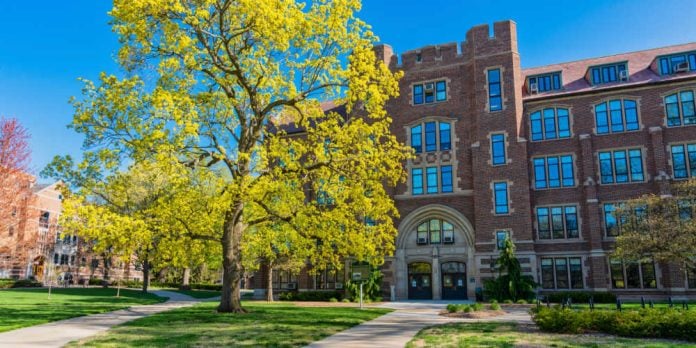The relationship between sports betting and the education system has been closely analyzed and criticized throughout 2023, and this hot topic is not likely to disappear any time soon as a study commissioned by the NCAA has found that sports betting is rife on college campuses.
The study, which surveyed 3527 college students aged between 18-22 during April, found that 58% of students had engaged in at least one form of sports betting during the last 12 months.
Whilst college athletes may have taken part in the survey, the NCAA noted that there was not a significant number to distinguish between the results of athlete and non-athlete students.
Publication of the study comes at a pertinent time when college sports betting has been cast under a dark shadow, following controversies and integrity concerns in both Alabama and Iowa in the last few weeks.
Further revelations revealed that 67% of students who live on campus actively bet and do so at higher volumes, whilst 41% of bettors have placed a bet on their own school’s team.
71% of bettors lose up to $100 daily
The survey, which was conducted by Opinion Diagnostics, revealed that 71% of students had reported a largest daily loss of up to $100, whilst a further 16.7% recorded a largest daily loss of between $100-$300. 5.9% of respondents recorded a largest loss of $300-$500, while a further 5.8% lost more than $500.
Meanwhile, the typical wager amounts are slightly lower than these amounts, as the mode average typical wager amount was between $10-$20. 79% of typical bets are between $1 and $50. A further 12.7% lost between $50 and $100, and 4.5% were typically wagering more than $100.
Researchers analyzed why students place bets on campus to determine how to tackle these issues and found that 59.2% of student bettors do so primarily to win money, something which will likely cause concern within the RG community. 40.8% of the students wanted to wager on teams or athletes they were fans of.
Of further interest in relation to RG strategy, 36.7% of respondents agreed with the statement: “If I were to frequently engage in sports betting activities, I could consistently make a lot of money.” Meanwhile, 32.1% of respondents disagreed with the statement.
Sports betting ads are driving activity amongst student population
Sportsbook advertisements and partnerships have been deeply scrutinized in recent months, particularly Caesars’ relationships with MSU and LSU and PointsBet’s agreement with the University of Colorado.
It would appear that such partnerships, of which there are certainly more than the two aforementioned examples, are being noticed on campuses and are effective in driving sports betting activity.
NCAA research detailed that 56.3% of students had seen or heard sportsbook ads at a casino, sportsbook, or on their mobiles. However, it is worth clarifying that this figure did decrease, albeit slightly, when it came to those students under the age of 21 and who lived in a state without legal sports betting.
On a qualitative basis, the report was ambiguous on whether it was an increased volume or effectiveness of ads that has driven this increase, but that ad recall is higher amongst those with higher levels of education.
However, the effectiveness of ads was revealed when 52.8% of respondents detailed that sportsbook ads have actively made them more likely to engage in sport betting activity, compared to just 19.6% who said it would make them less likely to.
Deeper analysis shows African Americans more likely to be exposed to betting
Throughout the report, it was revealed that people from minority backgrounds, particularly black and African Americans, are more likely to be exposed to betting and are overrepresented in certain factors. 13.6% of respondents were from a Black or African American background, with 51.2% being white, 13.6% Hispanic or Latino, 12% Asian, American Indian or Alaskan Native 4.1%, and 2.3% were Native Hawaiian.
In an analysis of risky behavior – defined by betting multiple times per day, losing $50 or more per typical bet, and losing over $500 in a day – Black or African Americans were overrepresented in the statistics, which showed that 16% of all 18-22-year-olds had engaged in at least one of those indicators.
Further, black or African Americans were a “notable outlier” in the statistics for largest loss in a single day, with 6% of the general 18-22 population losing over $500 compared to 10% of the African American cohort.
From an advertising perspective, whilst black or African Americans were exposed to advertising at a similar rate to other demographics, the group was impacted by an “outsized effect on increasing betting likelihood”, as 65% said they were more likely to bet after consuming adverts, compared to the overall 52.8% rate.
The report highlighted concern over the betting trends of minority consumers, detailing: “There is a concerning thread about Black or African American respondents’ attitudes about sports betting activities. Black or African American respondents are more likely to engage in betting activities, bet at a higher frequency, wager, and lose larger amounts of money, and are more confident in their ability to consistently win money via sports betting activities
“While Black or African American respondents do not recall seeing advertising at a higher rate than other ethnic groups, they report the ads being much more effective at increasing their likelihood of betting on sports.”
Other demographic factors showed less disparity, as 49.9% of respondents were male, 47.7% were female and 2.3% identified as “other”. Notably, however, 51% of women in the 18-22 cohort had taken part in betting activity and 25% admitted betting at least monthly.
NCAA President Charlie Baker commented on the study: “We needed a new baseline so we can better understand what student-athletes are experiencing on their campuses and among their peers so we can best help them deal with the potentially disruptive dynamic of legal sports betting.
“Sports betting has increased interest in sports of all kinds, including college sports, which is great for our fans, but the NCAA and everyone from coaches to athletics department staff and college presidents must better understand what impact sports betting may have on student-athletes.”
Next, the NCAA will conduct its national survey of student-athletes sports wagering report which has been undertaken every four years since 2003-04.















